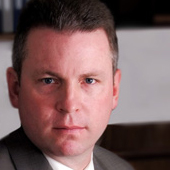In the early 1960s, after seventy years on the sideline, the legendary football coach Amos Alonzo Stagg had retired and was living in Stockton, California. At the small home he shared with his wife, Stella, not far from the campus of the College of the Pacific, Stagg lavished care on the grass of his front lawn. Despite his efforts, the ground cover was sparse.
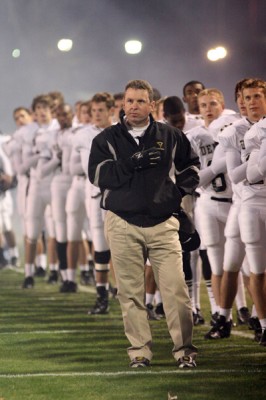 One day a neighbor stopped by and told the coach that in the mornings, when he was away from the house, the neighborhood children were using his lawn for their football field. “You’ll never raise grass that way,” the neighbor said.
One day a neighbor stopped by and told the coach that in the mornings, when he was away from the house, the neighborhood children were using his lawn for their football field. “You’ll never raise grass that way,” the neighbor said.
“That’s all right, sir,” answered Stagg. “I’m not raising grass. I’m raising boys.”
Stagg’s sentiment comes through often when you talk with Cody White, the head football coach and athletic director at Denison High School. White is on the field to win, but make no mistake, “It’s about the kids.”
Pregame
There are a dozen or so books on the shelf behind White’s desk in his office in the DSH Athletic office building. Churchill on Leadership is up there, so is Winning Maxims, but there is nothing about football, nothing about the Xs and Os of the game.
“The Xs and Os are a lot less than what people think they are,” he said. “The first thing I ask a coach in an interview is, ‘Why do you like coaching?’ The answer I want to hear is that they like kids. That’s the most important thing.
“The Xs and Os, I can teach a guy how to do that. I’ve got coordinators who can teach them. Joel Luper is a great example on our staff. Joe probably wasn’t ready for the Xs and Os part of it, but Joel loves kids, and he worked, and I had guys who could teach him, so he’s functioning really well and has gotten better as he’s gone on.”
Like other professionals in fields that are dynamically changing—doctors, lawyers, engineers—football coaches are never finished with school, and their continuing education programs gobble up much of their already limited free time. “We go to a lot of clinics and lectures,” said White. “We visit a lot of other programs. For the last two years here, we went to Appalachian State.” (Located in Boone, North Carolina, ASU is home to the Mountaineers, a team that won three straight NCAA Division I national titles— 2005-06-07—under Coach Jerry Moore, who grew up in Bonham.) “Last year we took our staff to the University of Texas. When you’re from a place like Denison, there are a lot of doors open for you that might not open if you were from somewhere else.”
And the Yellow Jacket coaches teach as well as learn. “My offensive guys just got back from giving a clinic in Dallas. There were 120 coaches there to learn the stuff that we do. There’s lots information out there if you want to take advantage of it.”
Despite being immersed in the game during the fall, the Denison coach still fi nds at least a little time to watch games on television, some games anyway. “I’m not an NFL fan,” he said. “I love college football, and when I get a chance, I watch it, but when the season ends, I don’t really want to watch football for a while.”
White was wearing a pair of slacks, a long sleeve shirt and black shoes so shiny he could use them for a mirror if he needed to comb his hair, and he remembers when coaches wore coats and ties on the sidelines in the manner of Tom Landry, but those time have passed and aren’t likely to return soon. Nevertheless, White understands that a lot of little things add up when you want to build a sense of pride in your kids.
“Bob [Brown] made them dress right. He was kind of old school. When we first got here, we had to wear a coat and tie to the game. He set up good expectations.” One of White’s expectations for his kids goes to the heart of why he is a coach. “I tell them, ‘I don’t really care about the score. I want to win, I’m super competitive, but really, I want them to be the best that they can be, on the field and in the classroom. “If you let yourself be defined by the scoreboard, you’re missing the boat. When Texas won the National Championship in 2005, Coach [Mack] Brown told the kids after the game, ‘Don’t let this be the best thing that ever happens in your life.
“We’re fortunate in Denison in having great teachers and principals who are exceptional about holding the kids accountable and letting us address problems. They know that if one of our kids messes up in the classroom they can email me, and I or one of my coaches will take care of it. If an athlete gets in trouble, he has to be held to a higher road.
“If Jordan Taylor [The Yellow Jacket quarterback, who does not get in trouble] gets in trouble, it’s not just Jordan Taylor, it’s Denison quarterback Jordan Taylor. These kids represent me, they represent my coaching staff, they represent this school, this town, and all those guys in the locker room. If a kid does something stupid, and let’s face it, our kids are going to do some stupid things, it reflects on all of us. It’s a blessing to be a part of the team, but at the same time it’s also a responsibility.
“Denison is a tough town. It’s a blue collar town. It’s not rich, and many of our kids come from broken homes, and a lot of them are just getting by. It’s tough. I understand that. They need to have something they can be proud of. ‘Jacket Pride’ or ‘It’s great to be a Jacket’ needs to be important to these kids. All our sports have to be like that.
“I tell the upcoming freshmen in the off season, ‘This is what you’ve inherited. It’s a great place, but you haven’t done anything to build this—the kids and coaches who came before you built it for you. You are blessed to be here. You could be at some new school in Dallas with no tradition, but you’re in Denison.’ As rough and tough as Denison is, there are some great things about this place, and I want them to know that, to take pride in that.
“I tell them when we start that our job as coaches is to love them. It may be tough sometimes because it’s not always telling you how good you are. Sometimes love is being realistic. If you screw up in class, we’re going to bring you down here and you’re going to do some extra whatever.’
“Then we tell them their job is to love each other—that’s when they usually start snickering— but that’s what it’s really about. I hope that when they leave here they will become better people than they would have been without this experience. It’s not 100 percent. We have kids who will graduate, and we have kids who will end up in prison. I know that. But if we just make a difference in a majority of the kids we touch, we’ll have done our job.”

First Quarter
“I was born in Bryan, Texas,” said White. “My dad was a Department of Public Safety trooper, so we moved around a bit. When he decided he wanted to go a different direction in his life, we moved to Branson, Missouri, and he worked for Silver Dollar City.
“Branson was an interesting place, a small place, about 2,700 in the eighties. That was before winter tourism, and it was alive in the summer and dead in the winter. My dad specialized in building water parks. He built several ‘Wet and Wild’ parks. Dad also worked at South Fork Ranch, where they filmed the TV show Dallas. He eventually went with Six Flags and was there until he retired. He’s an interesting guy.”
White’s parents divorced when Cody was a senior in high school, and both moved back to Texas. White, who had played football— he was linebacker and offensive lineman— for the Branson Pirates, finished his senior year, graduating in 1987, and headed back to Texas to enroll at Southwest Texas State—it’s Texas State now—where he continued his football career with the Bobcats.
“Little as I am, I was a center,” he said. “When I was going to Southwest Texas, I wanted to play just because I loved the game, but I’d had two knee surgeries while I was in high school, and after a couple of years, I decided to call it a day. At that time I wanted to be a doctor, and I had some cousins who were going to Baylor, so I gave up football and transferred to Waco.”
The future Dr. White finished two years of premed education at Baylor and then changed his mind. “I went home for the summer and thought, ‘I don’t want to go to school anymore. I don’t think medicine is something I’m driven to do.’ I looked back at the people who had influenced me and decided I wanted to coach. I wouldn’t be in an office all day. I like kids, always have, and well, I think it’s a little bit of a calling, like the ministry.”
The young man who didn’t want to go to school anymore went back to Baylor for another year and a half to get a teaching certificate and a second major. “I had a biology major, and then I got another major in English because I figured I didn’t want to teach biology, I’d rather teach English. Most people have about 136 hours when they graduate. I had 163.”
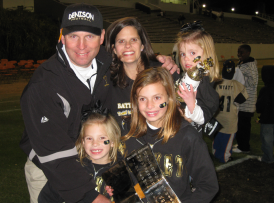
Second Quarter
White had little trouble finding his first job. “With English and biology, it was not difficult to find a teaching job,” he said. “P.E., it’s hard to find a job in P.E. It kills me when these kids say they want to be a coach, and they’re majoring in kinesiology. I tell them they’d better find something else. I can’t hire them. I’m tied with teaching fields, to positions the school needs to fill.”
For White, his education credentials were aces, and his family connections were a draw to a full house. “We were an Aggie family. My grandfather had been the dean of men at A&M, so he had contacts all over the state.”
Coach White took to the sidelines for the first time in Huntsville, where he spent a year and a half as the freshman coach. “That spring, I was going to be the varsity secondary coach when a guy named Scott Smith offered me a job in Duncanville as the freshman coordinator, which I accepted.”
Smith was another product of White’s family connections. “My family owns a Christian athletic camp in Missouri. Scott had been a camper and a counselor there, and because I was interested in moving up to the Dallas area, I went up there to meet him, just to make a contact.”
In June, when White and his wife Lori, returned from a short vacation prior to packing for the move to Duncanville, he got a call from Coach Smith. Smith was a Scot, not the kind who wears a kilt, but a Highland Park Scot. He had graduated from the Dallas high school whose football program has spawned Texas gridiron legends Bobby Layne and Doak Walker, and now he was going back to his alma mater as the head coach and athletic director.
“Coach Smith said he felt obligated to me since he had got me to come to Duncanville,” said White. “I knew Duncanville would get a good coach, but I told him, ‘You know, I’d like to work for you, so if you can get me a varsity job, I’ll come with you.’ ”
When Smith took over at Highland Park, several members of the old staff resigned and White stepped in to fill a slot. “To tell the truth, I was no way ready to coach at that level,” he said. “I learned on the fly. There are no classes in college to learn to coach football. You learn on the job from studying the game and from being with the right people. There are guys who work awfully hard at it and guys that don’t. Like any other job in America, there are guys who are good at it and guys who aren’t.
“When I went to Highland Park in 1996, I thought I was ready to be a varsity coach, but I wasn’t. I didn’t understand the game well enough. I realized it, and I had enough drive and pride that I wasn’t going to be the worst coach on the staff. I was going to be the best coach on the staff. On the offense, we had Scott and a coach named Price Clifford who was an all-American at Austin College, me and Dave Johnson who probably wasn’t ready either. Scott and Price taught us.”
The White family still numbered only two when they moved to Dallas, so they rented a duplex near the school. “I could throw a rock into the stadium, and I could walk to work every day.” In White’s first year at Highland Park, the Scotties went to the 4A semi-finals, where they lost to Denison.
Scott Smith stayed at Highland Park for three years before leaving to become an assistant head coach at Baylor. Although White was not in danger of losing his job at Highland Park, when Price Clifford took the job as head coach in Montgomery, Texas, northwest of Conroe, White went with him as offensive coordinator. “I knew you had to move in this kind of job, so I took a coordinator’s job, which is the next step if you want to be a head coach.”
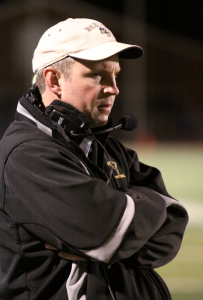
The young dream big dreams. The novice lawyer nervously waiting to make his first opening statement to a jury may well imagine himself one day appearing before the Supreme Court or perhaps even sitting on the high bench as a justice. The actress with a bit part in an indie movie may fall asleep at night rehearsing the speech she will deliver from the platform when she receives her Oscar. So may the young football coach, as he stands on the sidelines watching his junior high charges scrimmage before a thin crowd of proud parents, look up and see in his future a sea of burnt orange in Memorial Stadium in Austin or hear the roar of the crowd that greets the Dallas Cowboys.
Indeed, the young dream big dreams, and Cody White was no exception. “There was a time when I thought I might want to coach in college. I had an opportunity when Scott went to Baylor. You’ve got to start as a graduate assistant just like in high school, where you start as a freshman coach. I thought about it, and looked at what those guys do, and the time spent away from family—at that time we had our first little girl. I just don’t think it’s that conducive to a family life. No one wants it to be that way, but it usually is.
“I’m not a huge social person, so I think the recruiting part would have been tough. I’m honest with people, and I know I would have been fine with it, but it’s not my personality. I decided that high school was where I would stay, but I wasn’t necessarily where I wanted to be. I wanted to run a program. I didn’t want to be an assistant.”
The Montgomery Bears were in a world of hurt. The 4A school in an historic old Texas town—Montgomery bills itself as the birthplace of the Texas Lone Star flag—had lost twenty straight games when Clifford and White arrived. It did not get any better in a hurry.
“We coached our tails off and went 0-10,” said White. “It was an interesting experience, but it was miserable. We were everybody’s homecoming opponent. We were used to winning twelve or thirteen games a year at Highland Park, so it was very frustrating. It was a humbling experience.
“The next year we went 3-7, and I’ll still tell anyone who will ask that it probably was the most rewarding season I’ve ever had, including this last one. (In 2009, White’s Denison Yellow Jackets went 13-2, losing to Aledo in the state semifinals.) We broke the losing streak and beat Navasota for the first time in years. We worked hard, but we could see the kids learning how to win.” But White wouldn’t be around for the Bears’ next season. Denison was calling.
Scott Smith recruited North Texas for Baylor. He had been in Denison talking with Coach Bob Brown after the 2000 season and found out Brown was looking for a coordinator. Smith suggested White.
“When Coach Brown called, I was excited about the prospect just because of the name Denison High and knew it was something I couldn’t turn down. I knew Coach Brown, and I knew it would be a chance to work under somebody very different from Scott or Price. I’ve found as a head coach, that you take a little bit of the best of all the guys you work with. Plus my wife is from Oklahoma, so she would be closer to her family up here.”
White’s stay in Yellow Jacket land was brief, only one year. “That spring I was the track coach. At a meet, I ran into Coach Randy Allen, who was Highland Park and was also a family friend. He was doing something that was new at the time. He had just gotten into the shotgun and started running the spread stuff. He needed a quarterback coach, and I was very intrigued by the offense and wanted to learn it. So I went down there.”
Highland Park II also lasted only a year. Scott Smith had left Baylor and the college game for six-time state champion Odessa Permian and one of the most intensive football programs in Texas prep sports. Smith wanted White as an offensive coordinator, and White wanted to work for his friend and mentor again. And it was Odessa Permian, for goodness sakes.
“If there’s any place that will throw you into the fire so to speak, it’s Permian,” said White. “At Permian the booster club knows who the coordinator is, and they’re not afraid to be critical. It’s tough, but it was a lot of fun.”
Like Montgomery a few years earlier, Odessa Permian was coming off some not so successful seasons, so expectations were high, and the pressure on the new coaching regime was substantial. There was pressure of another sort for the new offensive coordinator. “Scott had no experience with the spread, so he let me run it, and he was my running backs coach. He never questioned me; he never second guessed me, but I had to learn fast.”
It was a good year in West Texas. Permian beat Midland Lee for the first time in several years, and topped cross town rival Odessa High while 24,000 watched in the stands. The second year was not as successful. “We had some kids get hurt. We did not play very well, and the reality of the place, in my opinion, is that they don’t give you nearly enough time. We had one year left on our contract when Scott told me they weren’t going to renew it. We had fixed so many things, but we weren’t going to get to finish the job.”
Hanging over White’s two years at Permian was the specter of Friday Night Lights, the bestselling book based on Permian’s 1988 season. Hollywood came to town for the 2003 football season to turn the book into a movie, put the town, the school and the football team into the spotlight.
“They were filming the movie while we were there,” recalled White. “It was kind of surreal. At halftime when I was talking to the kids, there would be boom mikes over the top because they wanted the reality of it all. They did get shots of our games, long shots. They matched the numbers on the actors to our kids’ numbers.”
The movie making was a yearlong affair. “At spring break, I could not wait to leave Odessa and spend some time with my family. Coach Smith had told us they were going to be filming at night over the break, and the coaches could make $25 an hour just watching the kids. The movie people had paid the school $10,000 to use the kids in the crowd scenes. I had no desire to hang around, so I wasn’t in the movie.”
Third Quarter
With no screen time, there was no call from Hollywood for White, but there was a call from Denison. “Coach Brown called and said, ‘Look, I’m not going to be in this much longer. I know you and Lori like it here, and we need to put in the spread, so why don’t you come back and be my coordinator?’ ”
White visited Denison shortly after Thanksgiving in 2004 and met with Coach Brown and Henry Scott (the DISD superintendant) and other school officials. “They didn’t tell me that I was the next head coach, but they said they were thinking of me in that capacity. I felt good about that, and they’d always been good people. But that’s not why I came. I liked Bob, it was a great opportunity, and we liked it here, so we bought a house and came back to Denison over Christmas break 2004.”
White took over the offensive reins of the Yellow Jackets for the fall of 2005 with two big things going for him. The strong backing of Coach Bob Brown and a kid named Stanley Morrison. “Stanley fit exactly what I liked to do as a quarterback. He could run.”
That year’s Yellow Jacket team surprised a lot of people. “They were picked last in the district,” said White. “They had lost Cory Robertson and a lot of good players. Nobody thought much of those kids. They had a bunch of injuries; they were changing to a completely new offense, but they were the co-district champions. It was a fun year and they found a way to win.”
At the end of the 2006 season, Brentwood Academy, a nationally known prep school in Nashville, Tennessee, contacted White about becoming their head coach. He visited the school, went through the interview process and was offered the job. “It was a great school, and it would have been very beneficial financially,” said White, “but it would have been a big change for me and my family.”
White went to Coach Brown to talk things over. “I said, ‘I’ve got the offer, and this is what it will pay. But the reality of Texas football is that if I leave here and take this job, I won’t come back here as a head coach. I could win ten state championships and it won’t count in Texas.’ ” It was a difficult choice, but one that did not have to be made.
Bob Brown decided to finish his contract as the athletic director and turn the head football coaching duties over to White, and when the referee started the clock of the opening game of the 2007 season, Cody White was the man in charge on the sidelines. “It was a good decision,” he said. “Lori and the kids are happy here, and I give a lot of credit to Dr. Scott and the school board for working things out. It took a little bit of faith in me for them to do that.
“This is a pretty lucrative job, and I’m not talking about the financial side, but the perception of what Denison football is in the state. If the job had been opened up, they would have had some pretty exceptional candidates.”
White’s first season as a head coach required some adjustments to the new role and its responsibilities. “I made a lot of mistakes, and we had a team of mostly freshmen and sophomores. We were 4-6, but we came from 18 points down to beat Sherman, and that’s important here.” So far, White is 3-0 in the annual Battle of the Axe, the second or third oldest high school football rivalry in Texas.
White’s second team, led by junior running back sensation D. J. Jones, won twelve straight before being knocked off in the regionals by the eventual state champs from Sulphur Springs. Last season, with Jones back for his senior year, the Yellow Jackets won the district and reached the semi-finals before losing.
Fourth Quarter
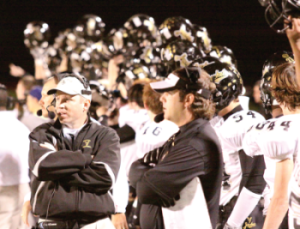
There is an often-quoted maxim in football: “There are two kinds of coaches, those who have been fired, and those who will be fired.” So far Cody White’s coaching career, both as an assistant and in his three-year tenure as a head coach, has been pretty smooth sailing. He has suffered through only three losing seasons, two at Montgomery and his second and last year at Odessa Permian. Still, there have been disappointments.
“Even though it ended up bringing me to Denison, I’ll always be disappointed that we knew how to fi x things at Permian, but we just didn’t get the time. I think they were unrealistic, and that’s a frustration.
“Part of the appeal of Denison is that they understand we’re a small school. They understand that our demographics are such that there are times when we’re not going to be great; we’re not going to have every year like we just had. We’ll have enough of them that we’ll be good, but I think that the people on the school board and Dr. Scott understand it. They’re realists. We live in an instant gratification society, but it just doesn’t work that way sometimes.”
Sometimes however, even the best of times are difficult. “This last year was tough. The expectations were so great, but they weren’t any more than I put on myself. Early on, we struggled, and I was asking, ‘What am I doing wrong?’ ”
On the second week of the season, Denison went on the road and was upset by Big Springs. “They were a good team, but they weren’t within 21 points of us. On the bus coming back to Denison, I talked with Scott [Smith] and told him that when we get off this bus at five in the morning, we’re going to the weight room, and I’m going to rip their tails. I was mad.
“Scott said, ‘Don’t do that.’ He calmed me down. So when we got back, I gave them Saturday off—we usually work out on Saturday—and Monday, when we met with them, I had calmed down. It was funny, on the way back, I had been praying I wouldn’t screw things up and do something wrong. You can say the wrong thing to kids and really hurt them. We didn’t play exceptionally the next week, but I could see we were getting better. Still, I was very frustrated until we got the McKinney game. The kids played really well, and that’s when I knew they understood how to win.”
Most of what White and his coaches and players were doing was very right. They went into the 2009 4A Division II playoff as district champions with a 9-1 record. “We drew a good bracket,” said White, “and I thought our chances were good, but I also know the reality. It is hard, hard to win as you climb the bracket. You have to get very lucky.”
The Yellow Jackets had a number of outstanding football players, and early on the college recruiters were on the hunt for future talent. “I don’t know that I handled the recruiting situation very well,” said White. “I think we developed a lot of hubris, that’s the best word for it, and it was hard, and we didn’t deal with it well. In a way it was surprising. These kids have won a lot, and this place has won a lot, but I didn’t address that like I should have.”
At Denison’s level of competition, the head football coach operates more in the style of a corporate CEO than of an old-fashioned down-in-the-trenches coach of the past. He manages the talents of his staff and his players, and in the case of Cody White, who is also Denison’s athletic director, he watches over all the other sports as well.
While White would like to see the Yellow Jackets excel in all sports, he knows that in some areas, it will be difficult at best to match the success Denison has on the gridiron. “We want to be, but there are issues with our geographic and socioeconomic status that make it awful tough, particularly in some sports. It’s hard for us to beat people in golf, when down in McKinney there six or eight golf courses. The golf coach at Highland Park told me once that he had a player with relatives on the PGA Tour. The dad came up at the beginning of school and said, ‘Look, I paid $30,000 for his swing. All you do is get them on the bus, get them off the bus, and bring them home. That’s it.’ That’s what we’re dealing with. We can’t do anything about that, but we can put the structure in place so a kid can be the best he can be.”
White can work to help the other sports, but this is Texas and football is the centerpiece in most high school athletic programs, so that’s what drives the bus. “Kids start playing football in seventh grade,” said White. “My staff is in control of the junior high staff. The junior high coaches are up here at spring break, and then during the summer we bring them in early and basically have a coaching school. They get a condensed version of what we do, and we tell them what plays they can run. During the season, we do it for every game. During the spring, our freshman staff goes over to get to know the younger kids who will be coming up, and the varsity staff works with our freshmen.”
At the varsity level White relies on his assistants, particularly the coordinators, to look after the myriad details that have come to dominate the cerebral side of football. “In some systems, particularly in college, the head coach just walks around, but I coach a position. I coach the quarterbacks, and I’ll always do that. The first year, even though I had brought Eddie Hancock in as offensive coordinator, I called the offense. I wanted him to learn it, and I knew we were going to struggle a little bit, and I didn’t want anybody but me to get the blame for bad play calls. I didn’t do a great job, but we did OK, but as soon as that season was over, I turned it over to Eddie. I thought we’d have a better offense, and I’d be a better head coach if I didn’t focus so much on just the offense.
“Zack Smith runs the defense. I don’t jack with him. Zack was young and, just like me, he made lots of mistakes, but he’s gotten better and better. We’ve led the district in defense the last two years. He’s really become good, and he knows I’m not going to interfere and I’m not going to second guess him on Saturday. I’ll give both my coordinators my suggestions, but then it’s their game to call on Friday night. I’d say my role is personnel. Sometimes coaches, particularly position coaches, tend to pigeonhole kids, so I try to see the potential in a kid, see the best ways he can help us.”
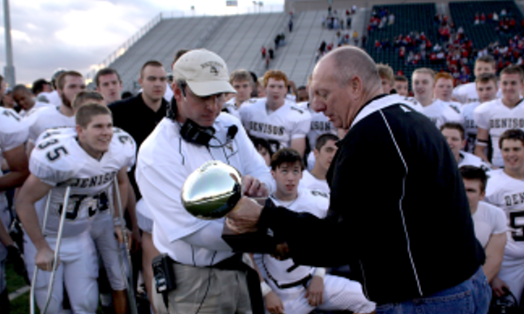
One persistent image of the football coach, no doubt engendered by the flickering image of Knute Rockne exhorting his Notre Dame squad to “win one for the Gipper,” is of the coach as motivator. While not discounting the modern coach’s role in “firing up the troops,” White has a different approach. “People are unrealistic about what coaches can do to motivate,” he said. “I think a lot of the motivation comes from the off-season time and what we do then. If the kids put the investment into it, if they feel the pain; if they push a little hard when they don’t think they can do anymore, they’re motivated. They have invested a lot of themselves into it.”
Another part of White’s role as he sees it, is preparing his assistants to reach their goals. “It’s the biggest job you have—hiring people. My dad put it this way, ‘I want to make the highest-level decision capable of being made at the lowest level possible.’ The best thing I can do is create an environment where those guys can be successful and enjoy being here. Most people go to coaching school just to socialize, so we don’t go. We go on a staff retreat, all nineteen of the coaches from junior high to high school. We work in the mornings, and in the afternoons we just hang out. We usually do it the first week of August.”
Post Game
Cody White sees so much more in his “calling” than just what happens on the field. He comes from a strongly religious background and is not afraid to let that influence how he goes about his job. It is not easy in a society where there are scores of naysayers waiting to be “outraged” by almost anything in the public domain that smacks of faith.
“We go to Parkside Baptist and have since we got here, but there a lot of really good ministers and churches in this town. We do a breakfast on Thursday mornings for a group of kids, and guys at some of the churches do the cooking. We have a diverse group of business men who participate and mentor our kids. We call it the Community Outreach Breakfast, and it lets the kids meet some of the really good people in our community. It’s been a neat deal.”
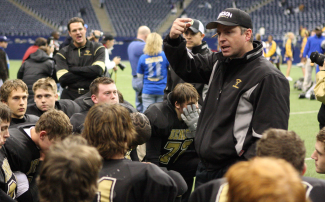
DHS has more than one White on the staff. After teaching elementary school in her previous locations, Lori White is now the librarian at the school. The Whites have three daughters, Ashlynn, eleven, Kathryn, eight, and Loren, four. “No football players,” said White, with a smile. “That’s probably a good thing. If I had boys, I’d be too hard on them.”
During his first stay in Denison, Cody White picked up a Masters in school administration from SOSU. “I could get the principal certification if I took the test, I guess. Someone asked me if I was going to get a doctorate, and I said ‘Absolutely not. I’m never going to be a principal.’
“I should know better than to say that because I sometimes accuse my wife of using ‘always’ and ‘never’ way too often. Things change, but I don’t see myself ever wanting to coach in one of those huge 5A, multi-school district schools. I don’t want to say never, because you never know. There’ll be some opportunities if I want to go somewhere else, but I’m very happy here, my wife and family are happy here. Dr. Scott and the school people have been very good to me.
“I want to look back one day and say that the programs had some success, that some of the guys working for me moved on to be head coaches, and that we helped some kids along the way. It’s really about the kids.”
Do you have a great story to tell about Coach Cody White? Share it with our readers.

